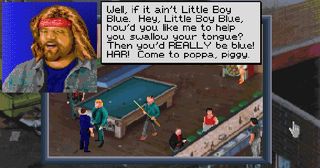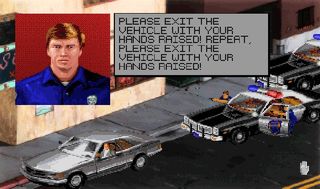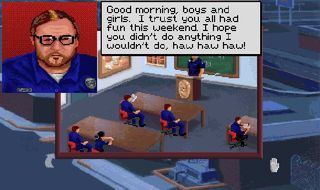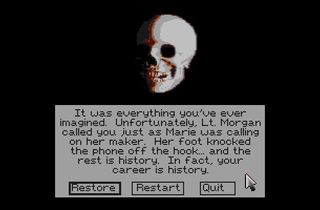Police Quest pretended to be serious, but was really a nonsensical fever dream of a game
Reinstall.

I never could take Police Quest seriously. I know I probably should. It's certainly a serious game—an interactive police-procedural adventure written by a real cop, and supposedly used by others as a training tool. For me though, it was always something else—closer to the dreams good cops probably have after eating too much cheese before going to bed. It's like a fevered nightmare of repressed paranoia, lessened only by a little guilty wish-fulfillment to round off a long day of being abused and unappreciated.
Police Quest's goal is to simulate the experiences that a real cop might have on a daily basis. So, like most dreams, it starts out rooted in reality. You're Sonny Bonds, a regular beat cop, going about his day in the decaying Lytton City (the bigger mystery plot shows up much later). You drive around until your radio tells you something's going on, then you drive over there and deal with it. You stop speeding motorists. You call in the appropriate authorities at an accident scene. You chat with a hottie who turns into a spitting hellcat if you don't let her out of a ticket (and gives you the police commissioner's wife's phone number if you do). You sort out trouble at a coffee house. In short, you do your job.
Badgered

Oh, and you die. A lot. This is where our sleeping cop's paranoia kicks in. Even by Sierra standards, Police Quest wants you dead. Run a red light? Game over. Don't call for backup? Bye-bye. Don't check your gun into a locker before going into jail? The perp will pull it from your belt and pop you. This is a game where you can single-handedly face down a bar full of bikers, only to get cold-cocked by an incorrectly handcuffed drunk. In the original version, you don't simply have to check your car before you head off on patrol—you have to manually walk to all four sides and check them each in turn, otherwise you instantly blow a tire. The kicker? If you do the check, nothing is wrong. That's just cruel!
Both versions of Police Quest are brutal—the original, released in 1987, uses a text-parser interface, the 1992 remake uses icons. You can muddle through the icons, but the only way you were getting anywhere with the text version was to follow the manual's procedures down to the letter, literally.
Of course, that strict adherence to proper procedure actually makes the moments when Police Quest goes utterly insane all the funnier. For starters, while the story technically takes place over the course of a few days, in practice you never go home or off-duty for more than five minutes, making the whole adventure seem like some bizarre, mirror-universe season of 24 where Jack Bauer is a stickler for due process. Even better: in the text-driven version, you can type "remove uniform" and Sonny will actually get his little nightstick out in the middle of a crime scene before dying of shame. Yikes.
With a heart of gold

Finally, there's the game's love interest. Oh boy. Now, I'm not saying a cop and a hooker shouldn't fall for each other. I'm just saying that I can't not giggle at a by-the-book cop ending up with a callgirl (who happens to be your former high school sweetheart) named Sweet Cheeks.
The story only gets sillier from that point too, as you use her sex-work connections to track down the titular Death Angel (a drug dealer called Jessie Bains—Sonny's nemesis in the sequel, but largely irrelevant until the end of this story) by going undercover and beating his friends at poker.
The biggest gaming news, reviews and hardware deals
Keep up to date with the most important stories and the best deals, as picked by the PC Gamer team.
Alternatively, you can screw up, miss the big game due to sleeping with Sweet Cheeks instead, and lose your career when your boss calls and hears her screaming out in pleasure. Being the single best game-over in Sierra history doesn't make that feel any less out of place in a "serious" police game.

But Police Quest isn't serious—not really. It pretends to be, but it's the clash between its by-the-book attitude and the gamey parts that makes it so charming, and it knows it. The sequels wasted little time upping the stakes, with Sonny moving to the Homicide Department, and a third game involving an evil cult.
Still, this first game was always my favorite, especially the more down-to-earth parts that simply try to convey the flavor of being on patrol. A real cop may not find Police Quest to be a realistic simulation of his profession, but at least he can appreciate that by playing it, we learn about the hookers, bar fights, and rigid rules he must abide by in order to keep us all a little bit safer.
On the next page: More Police Quest screenshots from our archive
Most Popular

